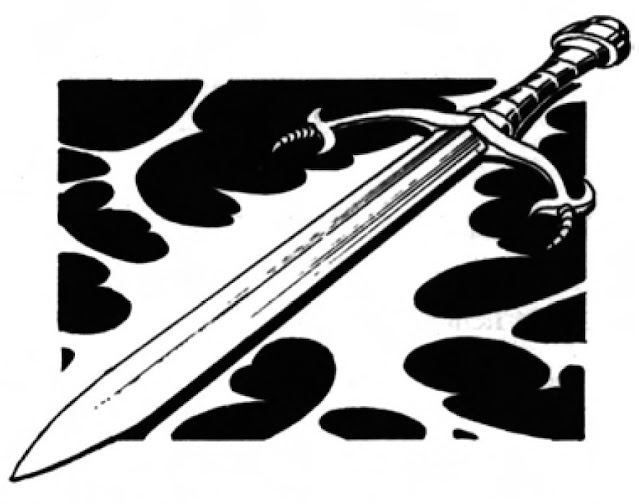During a recent discussion on the NSR discord server the subject of intelligent magic items popped up, and I was immediately reminded of the rules for generating intelligent swords in the Frank Mentzer Expert Set.
 |
| Drawing of a magical—possibly intelligent—sword by Larry Elmore |
There are other, similar rules for intelligent swords in Moldvay. Seeing as this is the go-to old-school ruleset (and likely the basis for any similar rules in OSE or Basic Fantasy), I'm ignoring those. Likewise—as with my [positively ancient] post about dwarf clerics— this is a paraphrasing of existing mechanics. I'm not adding anything original here.
I have a more interesting stab (ha!) at this topic over on Iconoclastic Flow:
https://flowiconoclastic.blogspot.com/2022/10/blades-with-brains.html
...and yes, it's swordtember, so I suppose the timing is germane.
OSE SRD
A concise and updated interpretation of Moldvay's B/X sword rules are available via the OSE online SRD. Big thank you to Tim B. of the NSR Cauldron for bringing that to my attention:
https://oldschoolessentials.necroticgnome.com/srd/index.php/Sentient_Swords
Intelligence
To randomly determine a sword's intelligence, roll 1d20.
On a roll of 13 or less, the sword is not intelligent.
On a 14 or higher, roll again and consult the table below:
Languages
The majority of intelligent swords speak telepathically to anyone holding them. They answer questions to the best of their knowledge and ability, and only if drawn.
The same applies to speaking swords, except they speak aloud in one of its known languages. These are determined by the DM, though speaking swords automatically speak their alignment language.
Speaking swords are not necessarily literate: only swords that can read magic can also read any of the languages it can speak.
Alignment
Primary Powers
- Detect evil/good: Either detect good OR evil (not both), as per the cleric spell. Range of 20'.
- Detect gems: Can locate an enummerate all gems within 60' range via pointing and its preferred communication method.
- Detect magic: As per the spell up to 3 times per day.
- Detect metal: Can detect any type of metal within 60', by pointing. Cannot determine quantity or amount.
- Detect shifting walls and rooms: The sword points towards any of these architectural features within 10'.
- Detect slopes: As above, but for sloping passages.
- Find secret doors: 3 times a day and with only a 10' range [note: that is pretty pathetic, suggest extending to 60')
- Find traps: Traps of all varieties within 10' are detectable if the holder wills it, up to 3 times per day.
- See invisible: Locates all invisible objects and creatures as the wielder wills it (no noted limits or restrictions)
Extraordinary Powers
- Clairaudience: Wielder is able to hear through the ears of a creature within 60' (up to 1d6+6 turns)
- Clairvoyance: Wielder is able to see through the eyes of a creature within 60' (up to 1d6+6 turns)
- ESP: Wielder may listen to the thoughts of any one living creature within 60' (up to 1d6+6 turns)
- Extra damage: When commanded, the sword does quadruple damage for 1d10 rounds. If this power is rolled again, the power of the effect increases to 5x damage (and 6x if rolled again etc.)
- Flying: Wielder may fly up to 120'/round without tiring, for a maximum of 3 turns per use.
- Healing: Regenerates up to 6 points of damage to the wielder per day, at the rate of 1 hit point per round. If this ability is rolled again the healing amount increases by 6 (then 12 etc.), though the rate remains the same.
- Illusion: At will the wielder may cast phantasmal force
- Levitation: The wielder may levitate up or down at a maximum rate of 60'/turn (up to 1d6+6 turns)
- Telekinesis: The user may move up to 200 lbs of weight by mere concentration. (no range or duration given, nor how fast it can be moved: suggest walking pace, within 60', and for as long as the wielder is able to concentrate)
- Telepathy: As ESP, with the added bonus of communication being 2-way.
- Teleportation: The wielder of the sword may cast "teleport" once per day only.
- X-ray vision: Wielder may see a distance of up to 30' through solid materials, with the exception of lead or gold. By concentrating for a full turn they may inspect a 10' x 10' area, revealing the presence of any traps or secret doors.
Ego & Willpower
- Add the sword's intelligence to its ego
- Add one to this total for each extraordinary power
- Reduce by one for each HP damage received (maximum 8)
- Subtract 1d10 points if the wielder is of a different alignment to the sword.
- The first time they are handled
- Whenever the wielder is wounded
- If the wielder acquires another magical weapon
- If the wielder attempts to give the sword to someone else
- If an incident related to its special purpose arises (see below)
- New magic weapons are discarded or ignored.
- The wielder charges into combat to win glory for themselves and the sword
- Money is spent on embellishing the sword or its scabbard with gold and jewels etc.
- The character is forced to surrender the weapon to a more worthy wielder
- The sword forces the character to fulfil its special purposed
Special Purposes
- Slay a character type (such as clerics)
- Slay a monster type (such as gargoyles)
- Slay a specific being
- Slay a race type (such as demi-humans)
- Defeat a specific Alignment
- Law: Chaotic opponents struck must Save vs. Spells or be paralysed.
- Neutrality: wielder gains +1 to all Saving Throws while fighting for the special purpose..
- Chaos: Lawful opponents struck must Save vs. Petrification or be turned to stone.
Links
https://discord.gg/eHP4eSbz
https://tinyletter.com/Atelier_Hwei

No comments:
Post a Comment